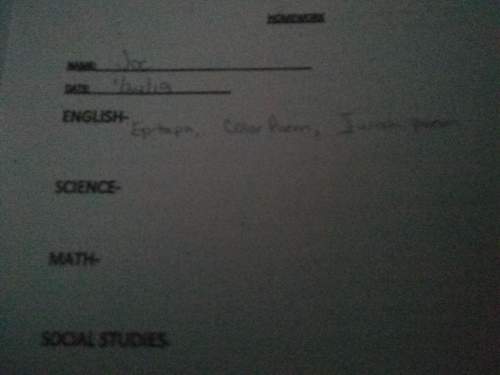“mending wall”

English, 25.12.2019 18:31 pettitchristy1
read the following poem, then chose the best answer to the questions.
“mending wall”
by robert frost
something there is that doesn't love a wall,
that sends the frozen-ground-swell under it,
and spills the upper boulders in the sun;
and makes gaps even two can pass abreast.
the work of hunters is another thing: 5
i have come after them and made repair
where they have left not one stone on a stone,
but they would have the rabbit out of hiding,
to the yelping dogs. the gaps i mean,
no one has seen them made or heard them made, 10
but at spring mending-time we find them there.
i let my neighbor know beyond the hill;
and on a day we meet to walk the line
and set the wall between us once again.
we keep the wall between us as we go. 15
to each the boulders that have fallen to each.
and some are loaves and some so nearly balls
we have to use a spell to make them balance:
"stay where you are until our backs are turned! "
we wear our fingers rough with handling them. 20
oh, just another kind of out-door game,
one on a side. it comes to little more:
there where it is we do not need the wall:
he is all pine and i am apple orchard.
my apple trees will never get across 25
and eat the cones under his pines, i tell him.
he only says, "good fences make good neighbors."
spring is the mischief in me, and i wonder
if i could put a notion in his head:
"why do they make good neighbors? 30
isn't it where there are cows?
but here there are no cows.
before i built a wall i'd ask to know
what i was walling in or walling out,
and to whom i was like to give offense. 35
something there is that doesn't love a wall,
that wants it down." i could say "elves" to him,
but it's not elves exactly, and i'd rather
he said it for himself. i see him there
bringing a stone grasped firmly by the top 40
in each hand, like an old-stone savage armed.
he moves in darkness as it seems to me,
not of woods only and the shade of trees.
he will not go behind his father's saying,
and he likes having thought of it so well 45
he says again, "good fences make good neighbors."
question 8 (1 point) question 8 unsaved
8. the poem describes a wall. how does the structure of the poem contribute to that
description?
question 8 options:
a) the repetition of the phrase "good fences make good neighbors" suggests that the speaker believes the saying to be true.
b) as one long block of text without any breaks between lines, the poem suggests the image of a wall.
c) the iambic pentameter establishes a quick, bouncing rhythm that emphasizes the poem's cheerful mood.

Answers: 3


Another question on English

English, 22.06.2019 01:00
One way to show a character is a) to use dialogue b) use dynamic sentences c) interview friends d) share details
Answers: 2


English, 22.06.2019 20:30
Read the two passages. passage 1 many people think that standardized testing is unnecessary; however, standardized testing is the only way to measure student achievement. viewing student testing only from a student’s perspective is missing the point. if we think of it in practical terms, we can see that testing students gives us a baseline to assist those students in their areas of greatest need. without standardized testing, that assistance would not be possible. passage 2 students experience anxiety during standardized testing. everyone knows this, and everyone should realize that no child deserves to feel unnecessary stress. imagine one of your own children suffering through the rigors of a week—or more—of testing. imagine that anxiety, even though there were clearly alternatives available to avoid it. this is just one of the many reasons to eliminate standardized testing in our schools. how do the fallacies in the first passage differ from the fallacies in the second? passage 1 contains an ad hominem attack, while passage 2 contains a false dilemma. passage 1 contains a false dilemma, while passage 2 contains a bandwagon appeal. passage 1 contains a bandwagon appeal, while passage 2 contains an appeal to emotion. passage 1 contains an appeal to emotion, while passage 2 contains an ad hominem attack.
Answers: 1

English, 22.06.2019 21:00
All of the following are common devices used by the satirist excepta. euphonyb. ironyc. allusiond. juxtapositione. hyperbole
Answers: 1
You know the right answer?
read the following poem, then chose the best answer to the questions.
“mending wall”
“mending wall”
Questions





Mathematics, 08.02.2021 18:30

Mathematics, 08.02.2021 18:30


Biology, 08.02.2021 18:30


Health, 08.02.2021 18:30



Chemistry, 08.02.2021 18:30

English, 08.02.2021 18:30









